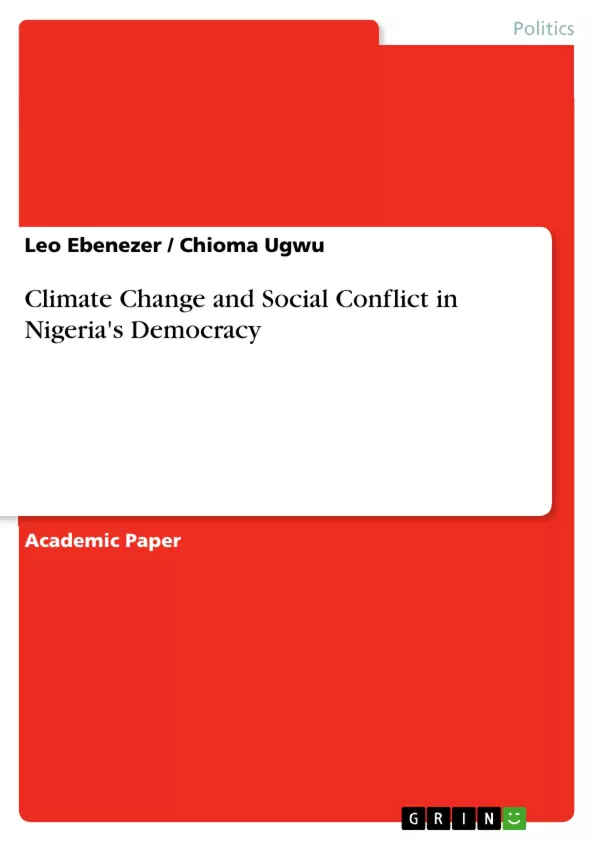This paper examined the impact of climate change on social conflict in Nigeria by identifying its progenitors and victims; and the roles of stakeholders in addressing the challenges of climate change adaptation and mitigation, especially social conflict. It x-rayed the two causes of climate change and locates the major trigger of social conflicts in Nigeria on the anthropogenic causes. The Anthropogenic Global Warming (AGW) and the social conflict theories were used to guide the analytical compass, using the conflict analysis perspective. This paper argued that the exploration, exploitation, refining and utilization of fossil fuels, soil erosion, desertification, environmental degradation, Green House Gas (GHG) emission etc. have negative consequences on the health and safety of the people, the supply chain and their socio-economic well being. The paper recommends democratisation of the people, respect for people's rights, unity, peace and stability of Nigerian democracy to ensure love for one another and unity of purpose for all. It also advocated the use of environmental impact assessment in the evaluation of projects by multinational corporations in Nigeria. The relationship between climate change and social conflict should be advocated by political elite in Nigerian democracy.
Inhaltsverzeichnis (Table of Contents)
- 1.1 Introduction.
- 1.2 Conceptual Clarifications.
- 1.3 Theoretical Framework.
- 1.4 Methodology
- 1.5 Impact of Climate Change on Social Conflict in a Democratic Nigeria...
- 1.6 Climate Change and Social Conflicts in Nigeria: Progenitors and Victims
- 1.7 Role of Stakeholders in Addressing Climate Change Adaptation and Mitigation Challenges Especially Social Conflict in a Democratic Nigeria.
- 1.8 Conclusion and Recommendations......
Zielsetzung und Themenschwerpunkte (Objectives and Key Themes)
This research investigates the impact of climate change on social conflict in a democratic Nigeria. It identifies the causes and consequences of climate change-induced conflicts, and explores the role of stakeholders in mitigating and adapting to these challenges.
- The relationship between climate change and social conflict in Nigeria.
- The causes and consequences of climate change in Nigeria.
- The role of stakeholders in addressing climate change adaptation and mitigation challenges.
- The impact of climate change on various regions of Nigeria, specifically the Niger Delta.
- The potential for social conflict arising from climate change-induced migration and resource scarcity.
Zusammenfassung der Kapitel (Chapter Summaries)
The introduction sets the stage by highlighting the growing concern over climate change as a conflict trigger globally, particularly in Nigeria. It emphasizes the vulnerability of Nigeria to climate change and its potential to exacerbate existing social tensions. The chapter examines the causes of climate change in Nigeria, focusing on the exploitation of fossil fuels and industrial activities. The impact of climate change in the Niger Delta region is also highlighted, with specific mention of the social conflicts that have arisen due to environmental degradation and resource exploitation. The introduction also explores the connection between climate change and social conflicts, such as those arising from herders/farmers clashes and migration due to desertification.
The conceptual clarifications section provides clear definitions of key terms, such as climate change and social conflict. It explains the anthropogenic nature of climate change and its impact on the environment, including global warming and greenhouse gas emissions. The chapter also defines social conflict as a result of incompatible interests and goals within a society, particularly focusing on the conflict arising from the impact of climate change on scarce resources.
Schlüsselwörter (Keywords)
Climate change, social conflict, Nigeria, Niger Delta, fossil fuel exploitation, environmental degradation, herders/farmers conflict, migration, adaptation, mitigation, stakeholders, conflict analysis, anthropogenic global warming.
- Quote paper
- Leo Ebenezer (Author), Dr. Chioma Ugwu (Author), 2020, Climate Change and Social Conflict in Nigeria's Democracy, Munich, GRIN Verlag, https://www.grin.com/document/926031



